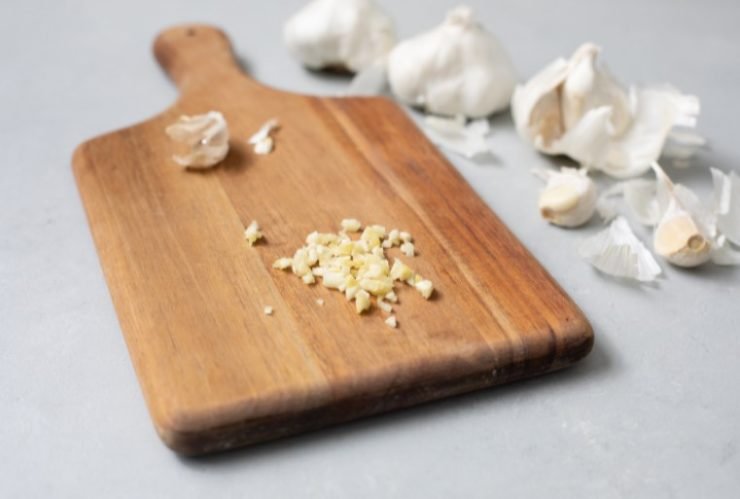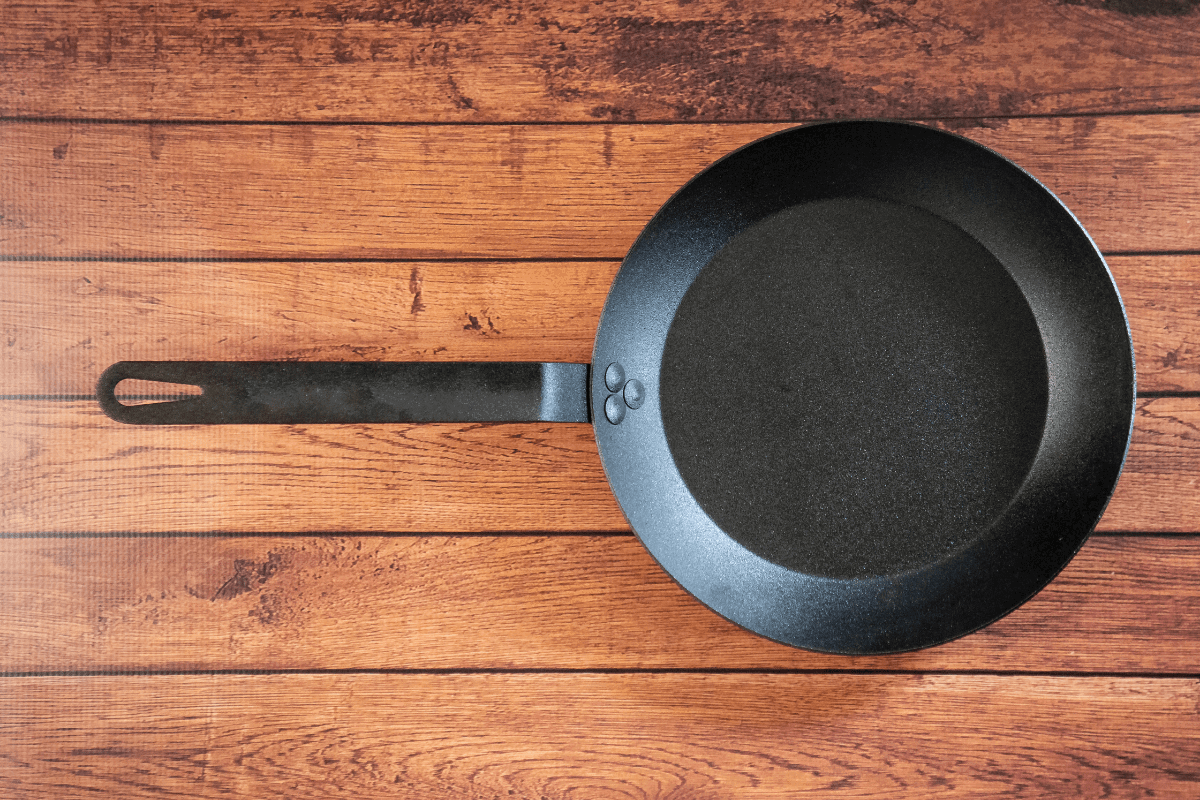Garlic is a delicious ingredient that’s used across almost every cuisine around the world.
Unfortunately, there’s no garlic governing body that requires recipes to use one standard form of garlic measurement. Instead, we have recipes that call for cloves, teaspoons, grams, and everything in between.
As a rule of thumb, one clove of garlic will yield about one teaspoon once it’s minced.
Working in restaurants I’ve minced enough garlic to join the Million Clove Club (not a thing, you say?..should we start it?), and I know that garlic cloves come in all shapes and sizes.
So, today we’ll look at common garlic conversions and substitutes to get you through any recipe with ease.
In This Article
How Many Teaspoons Are In A Clove Of Garlic?

To keep things simple and consistent, many chefs stick to the rule that one clove of garlic will yield one teaspoon when it’s minced. But, and it’s a big but, garlic cloves can be drastically different in size from one to the next.
Even within one bulb of garlic, you’ll find cloves of varying sizes. So when we say 1 clove = 1 teaspoon, we’re talking about the larger, outer cloves on your standard head of garlic. It’s a solid and easy estimate to remember, but an estimate nonetheless.
When in doubt, take a whole clove of garlic and actually place it in a teaspoon. It obviously won’t fill the measuring spoon very well while it’s whole, but it should give you a good idea based on the cloves that you’re working with.
How Many Tablespoons Are In A Clove Of Garlic?
One tablespoon is equal to three teaspoons. So, sticking to the “rule of thumb” that you can get one teaspoon of garlic per clove, three cloves of garlic will yield about one tablespoon of minced garlic.
Garlic Clove Conversion Table |
|||
|---|---|---|---|
| Garlic Cloves | Teaspoons | Tablespoon | Cups |
| 1 | 1 | ||
| 2 | 2 | ||
| 3 | 3 | 1 | |
| 6 | 6 | 2 | 1/8 |
| 12 | 12 | 4 | 1/4 |
| 24 | 24 | 8 | 1/2 |
How Much Minced Garlic From A Jar Is Equal To One Clove?

Pre-minced garlic from a jar has a strong flavor, but it’s a far cry from the fresh stuff. While it’s definitely not as sharp or spicy as fresh minced garlic, a little still goes a long way.
If you need to substitute it for garlic cloves in a recipe, start with a ½ teaspoon of jarred garlic per clove that the recipe calls for. And while minced garlic from a jar can save you in a pinch, it doesn’t provide nearly the same flavor as fresh garlic cloves.
How Much Garlic Powder Equals One Clove?

Garlic powder is made from dried garlic that has been pulverized or ground into a powder. Whenever you dry something, you’re getting rid of moisture and concentrating flavor.
So, when substituting garlic powder for garlic cloves, you’ll only need about an ⅛ of a teaspoon per clove. Also, since garlic powder is completely dry, it’s important that you give it time to rehydrate so its flavor can disperse in your recipe.
That means don’t add it at the very end of the cooking process. It also means that when you do add it, you may not be able to taste it immediately. So give it time to develop before tasting and adding more.
Does The Type Of Garlic Matter?

There are a wide range of different types of garlic grown and sold. Some tend to have smaller cloves than others, and some also have stronger or spicier flavors than others.
But, when it comes to buying heads of garlic at major grocery stores, they generally stock the most uniform and consistent garlic (and other produce) as possible. So for most people, you’ll get fairly consistent results most of the time.
However, if you’re shopping at local farmers’ markets, you may come across more variety and also more inconsistency from head to head (not a bad thing). In that case, don’t be afraid to talk to the farmer. They’re experts and 99% of the time very friendly.
What Can I Substitute If I Don’t Have Garlic?

There’s nothing quite like garlic, but there are a couple of substitutes that can work in a pinch.
Onions are much milder but they belong to the same family as garlic (allium) and can provide some of the same flavors.
Shallots are your best bet, but you can also use scallions, leeks, and chives. Or, although a little more obscure, ground asafetida is a spice used primarily in Indian cuisine that has a similar taste to garlic powder.
Tips For Buying, Storing, And Using Garlic
Buying Garlic

I know it’s tempting and easy to grab a head of garlic from a pile without thinking twice about it. But, taking an extra second to inspect your choice can go a long way in getting a better tasting and longer-lasting bulb.
Choose heads of garlic that are very hard, with cloves that are tightly held together. Avoid ones that are soft, shriveled, have dark spots, or are beginning to sprout.
Hard and tight bulbs are a sign that they were picked, cured, and stored properly before they arrived at the market. They’ll taste better and last longer.
Storing Garlic

Once you get your garlic home, try to store it in a dry and dark area out of sunlight. Sunlight will encourage the garlic to grow, especially if it’s already begun to sprout.
If your garlic cloves do have green sprouts, removing them before you cook will help you avoid the slightly bitter taste they can impart.
Cooking Garlic

When you’re cooking garlic, the flavor will get milder and sweeter the longer you cook it.
Raw garlic is pungent and spicy. But, if you gently roast it for an hour it will become sweet and complex.
The smaller you slice, mince, or crush your garlic, the faster the flavor will distribute throughout the dish.
That means recipes that call for a short cook time (i.e. stir fries) will benefit from smaller pieces. Whereas longer cook times (i.e. braises) will often call for roughly chopped or even whole cloves of garlic.
Here’s a quick tutorial on how to prep garlic – even if you’re already familiar with how to peel and mince, there’s a few handy tips in there. Especially if you’re just getting started.
Frequently Asked Questions
How Much Garlic Powder Do I Substitute For One Clove Of Garlic?
Use ⅛ of a teaspoon of garlic powder in place of each clove of garlic. Garlic powder takes longer for its flavor to distribute into a dish, so give it some time to cook before tasting and adding more.
What Is The Difference Between Crushed And Minced Garlic?
Minced garlic is finely cut but still has distinguished pieces and edges. Crushed garlic is smashed into very small pieces, close to a paste. When cooking, crushed garlic provides a stronger flavor immediately compared to minced garlic.
Can You Use Garlic Salt Instead Of Actual Garlic?
Similar to garlic powder, start with an ⅛ of a teaspoon of garlic salt in place of a garlic clove. Be sure to adjust the amount of salt added to a recipe to account for the saltiness of the garlic salt. If a recipe calls for a large quantity of actual garlic, be careful adding too much garlic salt as it can lead to a dish that’s too salty.







